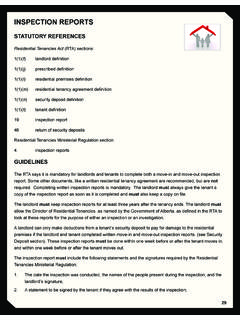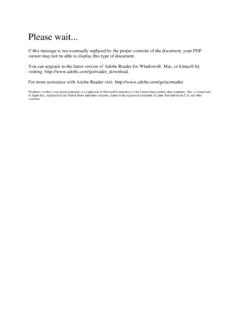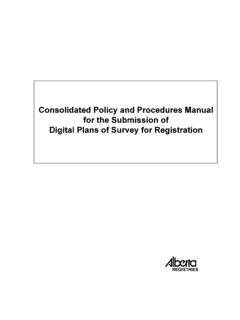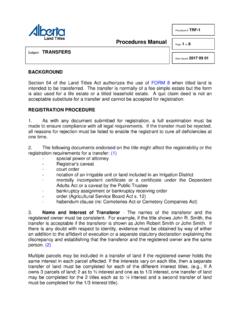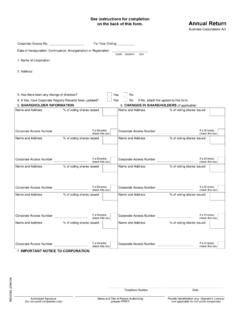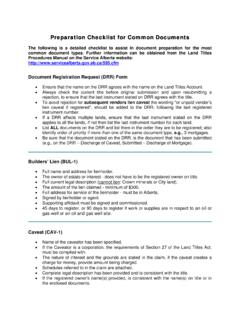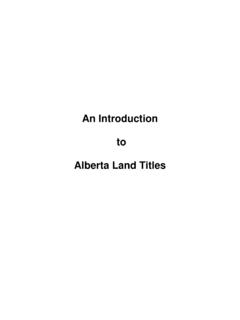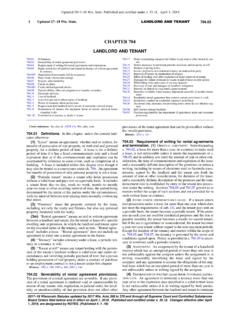Transcription of LANDLORD’S RIGHT OF ENTRY - Alberta
1 53 landlord S RIGHT OF ENTRYSTATUTORY REFERENCESR esidential Tenancies Act (RTA) sections:1(1)(f) landlord Definition1(1)(l) Residential premises Definition1(1)(t) tenant Definition1(2) Reference to Tenant16 landlord s Covenants23 ENTRY of Premises24 Locks and Security Devices37 tenant s RemediesThere are no sections in the Regulations relating directly to the landlord s RIGHT of tenant is entitled to the possession and peaceful enjoyment of the residential premises they are renting. Both the landlord and the tenant have to abide by the residential tenancy agreement and the obligations in the residential premises is the landlord s property and it is also the tenant s tenant should not be disturbed or inconvenienced by the landlord or anyone working for the landlord without a valid reason unless the tenant gives consent or is served with the required notice at least 24 hours before the time of WITH CONSENTC onsent is a voluntary agreement by a person to do something proposed by another person.
2 Consent under the influence of fear or terror does not amount to real landlord may enter the residential premises with the tenant s consent. If the landlord obtains the consent of the tenant , a notice of ENTRY is not required. The time for ENTRY would be arranged at a time convenient to both the landlord and the tenant . Landlords can phone or meet with tenants to obtain consent to enter the residential premises . Consent can be given verbally or in the tenant has made the landlord aware of needed repairs, the landlord may want to obtain the tenant s consent at that time to enter the residential premises to complete the repairs. Otherwise, the landlord will be required to give proper notice of ENTRY . Putting any type of consent agreement in writing is a good WITH NOTICEA landlord may enter the tenant s residential premises without consent if the landlord serves the tenant with a written notice of ENTRY at least 24 hours before the time of ENTRY .
3 landlord s can enter this way for the following reasons, to: Inspect the state of repair of the residential premises including excessive moisture and humidity; Make repairs to the premises ; Control pests as required; Show the premises to prospective purchasers or mortgagees; Show the premises to prospective tenants after the landlord or tenant has served notice to end a periodic tenancy or in the final month of a fixed term written notice of ENTRY must state the reason for the a landlord needs to enter all or several residential premises in a complex, the landlord must give each tenant notice of the ENTRY . For example: A landlord needs to enter all units to check the furnaces. A landlord cannot just post a notice of ENTRY in the common areas of the tenant does not have to be present when a landlord enters the residential premises .
4 The landlord has the RIGHT to enter as long as the landlord gives proper OF NOTICEA notice to enter the residential premises must: Be served on the tenant at least 24 hours before the time of ENTRY , Be in writing, Be signed by the landlord or the agent, State the reason that the landlord is entering the residential premises , and State the date and time of ENTRY that complies with the restrictions on holidays and hours of OF ENTRYThe notice has to state the time, or a period of time, for when the landlord is going to enter. Landlords may only enter with notice between the hours of 8 and 8 The timeframe given in the notice is supposed to be of reasonable landlord cannot enter on a holiday or a Sunday without consent. If the tenant has a different day of religious worship, the tenant must give the landlord written notice of that day.
5 A landlord can then enter on a Sunday, but not the day that is the tenant s day of religious date and time of ENTRY may be expressed as a period of time of reasonable duration, which must begin and end at a specified time. Landlords have the RIGHT to maintain their properties through inspections. Landlords should take into consideration the needs of landlords are flexible and considerate in entering rental premises and work with their tenants to make mutually satisfactory arrangements. Likewise, most tenants are understanding when it comes to ENTRY by the landlord . If notices give numerous times of ENTRY , the inconvenience could rise to such a level that the notices would be unreasonable. Notices that cover multiple days are not allowed. Each ENTRY requires its own written a reasonable duration involves balancing the tenant s RIGHT to privacy and the landlord s rights .
6 While it may be convenient for a landlord to serve notices to enter residential premises over many hours or days, convenience is not the same thing as reasonableness. Reasonable duration is determined on the specifics of the situation. Laws have been moving in the direction of increased privacy a tenant gives a notice to vacate, there needs to be some flexibility allowed to ensure that the landlord can show the property. While the tenant has a RIGHT to privacy, it s important to recognize the landlord s RIGHT to fill the tenant has the RIGHT to peaceful enjoyment of rented premises . Ultimately, a court or RTDRS will balance the inconvenience to the tenant and landlord in determining what is reasonable. As landlords don t always rent and sellers don t always sell to the first person to come along, it may take several days and several showings before a property is rented or sold.
7 The main point is that the sooner the place is rented or sold, the sooner the showings will WITHOUT NOTICEThe landlord may enter the residential premises without permission and without giving the tenant any notice for two reasons: If the landlord believes there is an emergency; If the landlord believes the tenant has abandoned the residential FOR EMERGENCIESAn emergency could be defined as an unforeseen combination of circumstances that calls for immediate action. Such things as smoke, unusual odors, flames, water damage, broken windows, heat or power failure, smoke detector alarm sounding and threat to life or property are considered landlord may enter the residential premises without consent or notice when they believe an emergency exists.
8 If an emergency happens when a tenant is not home, landlords should phone the tenant , ring the doorbell and knock on the entrance to the premises before using pass keys. Contact attempts should be the tenant changed the lock and did not give the landlord a key, emergency personnel can remove the lock or the door. The tenant has committed a breach of the RTA by not providing the landlord with a new key. (see Security: Keys and Locks section).PRACTICAL APPLICATIONSABANDONMENTT here are times when the tenant may be away for an extended period of time, but has not actually abandoned the residential tenant may vacate the residential premises without giving notice to the landlord and while the tenancy is still in there has been no communication from the tenant , the landlord must determine if the tenant has abandoned the residential premises .
9 To be safe, the landlord should serve the 24 hour ENTRY of the kinds of things that might cause the landlord to believe that a tenant has abandoned the residential premises are: Rent has not been paid; Mail addressed to the tenant is still coming to the residential premises without being picked up, or alternatively is no longer coming; The utilities (if in the tenant s name) have been disconnected; Newspapers have reason, a landlord could talk to neighbours, friends, relatives, tenant s employer or references given by the tenant to see whether they can provide a tenant abandons the residential premises before the end of the tenancy, the landlord may still be entitled to the rent that is owed for the remainder of the tenancy agreed to in the residential tenancy landlord must take reasonable steps to re-rent the unit.
10 If the landlord rents the premises to a new tenant , the old tenant is no longer responsible to pay the rent from the date the new tenant moved in until the date that their residential tenancy agreement was supposed to have a tenant left some belongings in the residential premises and the landlord believes on reasonable grounds that the abandoned goods have a total market value of less than $2,000, the landlord may dispose of the goods. If the goods have a value of more than $2,000, the landlord must store the goods for a period of 30 days. After the 30 days, the landlord can sell the goods at a public auction, or with the approval of a court by private sale. There are record keeping requirements that the landlord must abide by when there are abandoned goods.
